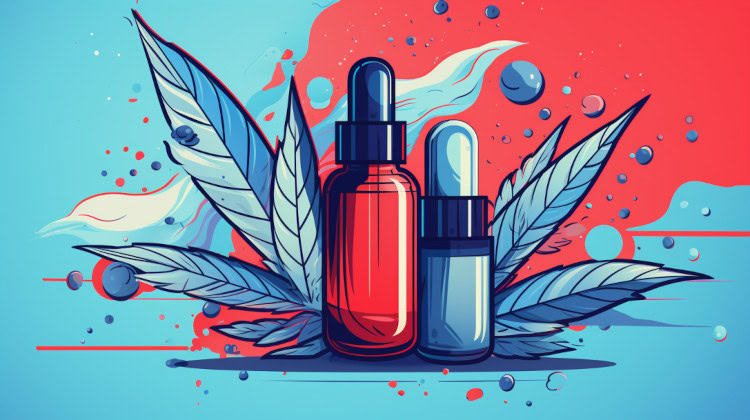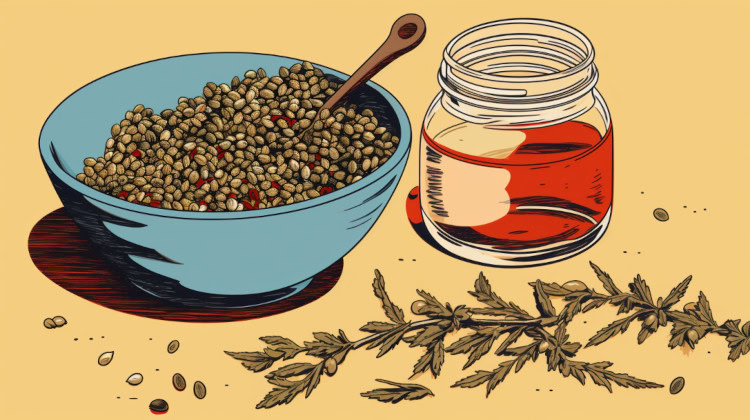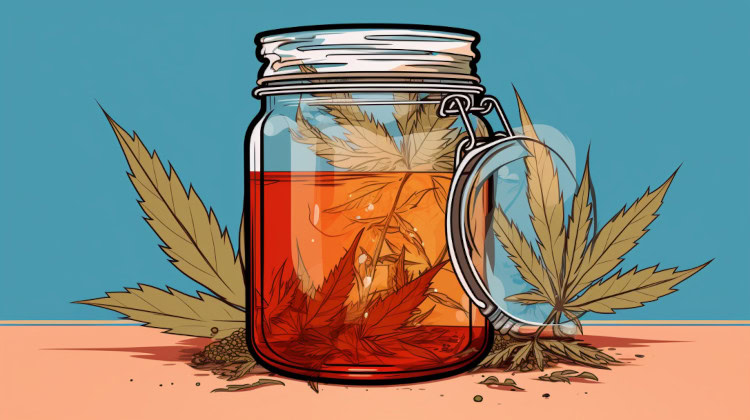In This Article
- Hemp Oil vs CBD: What's the Difference?
- What is Hemp Seed Oil?
- What is CBD Oil?
- When Should You Use Hemp Oil vs CBD?
- Will Either Hemp Oil or CBD Get Me High?
- Are There States Where Either Hemp Oil or CBD Is Illegal?
- Is Hemp Oil or CBD Oil Better for Relaxation and Aches?
- Can I Add CBD Oil to My Food?
- How Much Hemp or CBD should I consume?
- References
Key Takeaways
- Hemp oil and CBD oil come from different parts of the cannabis plant and serve different purposes.
- Hemp oil is mainly used for nutrition and skincare, while CBD oil is often used for potential wellness benefits.
- Neither will cause a high, but knowing the difference helps with choosing the right product.
The terms “hemp oil” and “CBD oil” are often used interchangeably by consumers. But, they aren’t the same. The reality is that there’s quite a bit of difference between hemp seed oil and CBD oil.
Thankfully, it’s easy enough to learn the differences.
The information in this website, including but not limited to images, graphics, text and other materials, is included for informational purposes only. None of the material on this site is intended to substitute for professional medical advice. Always seek advice from your qualified physician or healthcare provider if you have questions before starting any new healthcare regimen, and never disregard professional medical advice based on anything you read on this website or any other website.
This information, including images, is not medical advice. Consult a physician before starting or stopping medications or herbs, including cannabis. Information not evaluated by FDA and not intended to diagnose, treat, cure, or prevent disease.
Hemp Oil vs CBD: What's the Difference?

Broadly speaking, hemp oil is used for nutrition, while CBD oil is chosen for its cannabinoid-based wellness.
Hemp oil, often called hemp seed oil, is pressed from the seeds of the hemp plant. While rich in nutrients, it contains little or no CBD.
Conversely, CBD oil is made by extracting the cannabinoid cannabidiol (CBD) from the flowers, leaves, or stalks of the cannabis plant.
According to U.S. law, CBD products must contain 0.3% or less THC to be legally sold and classified as CBD.1 Any items found to be in excess could face state or federal penalties, including commercial or home-made CBD products.
In either case, neither hemp oil nor CBD oil will produce intoxicating effects. In other words, neither product is intended to make a person feel “high” like they would with THC.
| Hemp Oil (Hemp Seed Oil) | CBD Oil | |
| Source | Hemp seeds | Hemp/cannabis flower/leaves |
| CBD Content | None or trace amounts | High |
| THC Content | None | Less than 0.3% (if hemp-derived) |
| Uses | Nutrition, skincare, cooking | Wellness, relaxation, daily wellbeing |
| Legal Status | Legal in most states | Legal if <0.3% delta-9 THC, still varies |
What is Hemp Seed Oil?

Hemp seed oil is a nutrient-rich oil. It is derived from cold-pressing hemp seeds and is valued for its culinary uses and as part of wellness routines.
Hemp seed oil doesn’t contain significant amounts of CBD or THC, and shouldn’t cause any intoxicating effects. Rather, it is packed with nutritional compounds, including:
- Omega-3 and omega-6 essential fatty acids
- Complete plant-based protein
- Vitamins E and B
- Minerals such as magnesium and iron
These nutrients make hemp seed oil a go-to choice for individuals seeking healthy options to eat or apply to their skin, depending on the oil.2,3
Some pet owners even report using hemp seed oil for their animals. However, veterinary consultation is recommended before introducing any supplement to an animal's diet.
What is CBD Oil?
CBD oil is a term used to describe hemp-derived oil that contains the cannabinoid cannabidiol (CBD). This compound is found in both hemp and cannabis plants.
CBD oil is extracted from the plant’s flowers, leaves, and sometimes stalks. When the oil is bottled and sold without any further refinement, it will contain CBD as well as trace amounts of the strain’s other cannabinoids and other plant compounds.
Commonly found compounds include CBGA, CBC, CBDV, and THCV, in addition to CBD.4 These products are often marketed as full-spectrum CBD products.
The extracted oil may be further refined to contain only a few of the plant’s compounds (known as distillate or broad-spectrum oil). Any trace amounts of THC and its variants are often removed at this stage.
CBD may also be refined to the point that only a single compound is present in its final form (known as an isolate). While distillate comes in an oil form, isolate’s final form is a white powder substance that can be added to various items, including oils.
CBD oil is available in various forms, including:
- Tinctures
- Capsules
- Gummies and other edibles
- Vapes
- Topicals
When Should You Use Hemp Oil vs CBD?

There are recommended times and uses for both hemp seed oil and CBD oil. Each consumer will have their own ideals and preferences, but a general rule of thumb is:
Hemp oil common uses:
- Nutrition (food, drinks, and condiments)
- Skin and hair care (moisturizing lotions, shampoos)
- People who want to avoid cannabinoids but enjoy the benefits of hemp
CBD oil reported common uses:
- Relaxation or stress support
- Occasional aches or discomfort
- Sleep support
- Those interested in the potential benefits of cannabinoids, often with little to no THC involved
Some patients also explore CBD oil under medical supervision, including pediatric cases, though this should only be done in consultation with a qualified healthcare provider, especially since CBD hasn't been evaluated or approved by the FDA.
Will Either Hemp Oil or CBD Get Me High?
No. Neither hemp seed oil nor hemp-derived CBD oil will get a person high. That’s because, unlike THC, CBD does not produce intoxicating effects. However, a full-spectrum CBD may contain enough other contributing compounds to create an entourage effect. If you still feel something with CBD, it’s because it’s still technically psychoactive, just not intoxicating.
Are There States Where Either Hemp Oil or CBD Is Illegal?
Hemp seed oil is legal in the United States. However, it must be made from hemp and contain 0.3% or less of delta-9 THC.
That said, some states have additional regulations that may restrict the sale of CBD products. Some state laws may require additional labeling and testing. As such, consumers should always check local regulations before purchasing or traveling with CBD oil.
Is Hemp Oil or CBD Oil Better for Relaxation and Aches?
CBD oil is more commonly chosen by consumers seeking relaxation or support for occasional discomfort. Someone’s chill time might be someone else’s morning pick-me-up, as everyone’s experience varies. On the other hand, hemp oil is usually used as a nutritious addition to the diet.
Still, anyone considering seeking physical or mental relief from hemp should first consult a medical professional. Doing so will allow the patient to best understand their unique medical needs and how hemp may impact their ongoing treatment.
Can I Add CBD Oil to My Food?
Yes, like hemp seed oil, CBD oil can be used in a person’s diet. In many cases, CBD oil can be added to recipes, providing a subtle addition of cannabinoids to any dish.
While CBD oil can easily be integrated into most food recipes, consumers should exercise caution when using it in beverages. Like other oils, CBD oil does not mix with water, unless the product is listed explicitly as water-soluble.
How Much Hemp or CBD should I consume?
Each person has a different ideal dosage and personal threshold. While many people tolerate hemp and CBD well, some may experience side effects or interactions with medications. Consumers should start with low doses and increase gradually, ideally consulting a healthcare provider beforehand. This method is called the “start low, go slow” approach, and helps avoid most overconsumption risks.
References
- McPartland JM. Cannabis Systematics at the Levels of Family, Genus, and Species. Cannabis and Cannabinoid Research. 2018;3(1):203-212. doi:https://doi.org/10.1089/can.2018.0039 ↩︎
- Xu Y, Li J, Zhao J, et al. Hempseed as a nutritious and healthy human food or animal feed source: a review. International Journal of Food Science & Technology. 2020;56(2):530-543. doi:https://doi.org/10.1111/ijfs.14755 ↩︎
- Crescente G, Piccolella S, Esposito A, Scognamiglio M, Fiorentino A, Pacifico S. Chemical composition and nutraceutical properties of hempseed: an ancient food with actual functional value. Phytochemistry reviews. 2018;17(4):733-749. doi:https://doi.org/10.1007/s11101-018-9556-2 ↩︎
- Chen X, Deng H, Heise JA, et al. Contents of Cannabinoids in Hemp Varieties Grown in Maryland. ACS omega. 2021;6(47):32186-32197. doi:https://doi.org/10.1021/acsomega.1c04992 ↩︎
The information in this article and any included images or charts are for educational purposes only. This information is neither a substitute for, nor does it replace, professional legal advice or medical advice, diagnosis, or treatment. If you have any concerns or questions about laws, regulations, or your health, you should always consult with an attorney, physician or other licensed professional.




